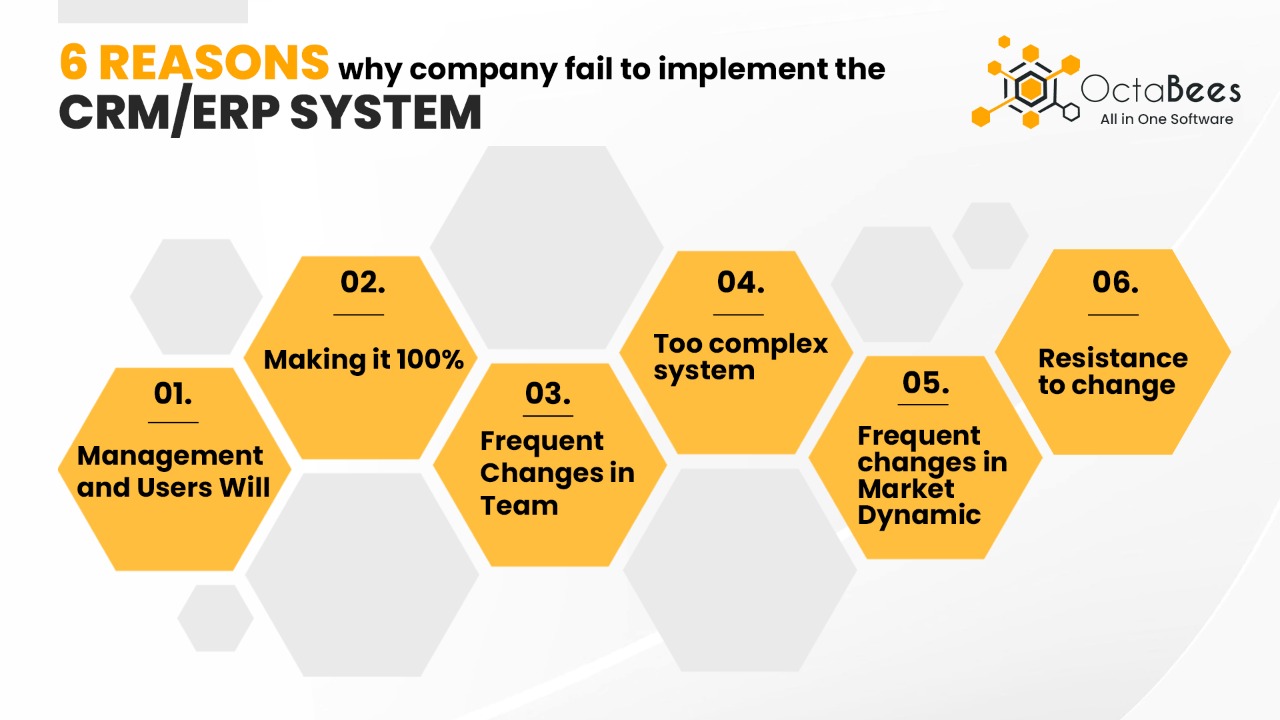Project Health Dashboard Successful project management is critical for organizational success. With so many moving…

6 Reasons why company fails to implement the CRM/ERP System
By implementing an enterprise resource planning (ERP) & Customer relationship Management (CRM) system in your organization, you can enhance your existing workflows and meet changing market demands. But, a single mistake during the implementation can cause you to lose millions of dollars. Many organizations that make errors during the implementation lose millions and see a big drop in sales. It happens because they fail to address major flaws during the ERP / CRM implementation process.
However, you can avoid the same losses by making sure to address the challenges during your ERP implementation.
To overcome bottlenecks during the process, learn from the mistakes other organizations make and take preventative measures.
List of Major reasons why organization fails to implement the CRM/ERP System.
1) Management and Users Will
By nature humans are lazy. All are comfortable with what they have. Employees will have to put effort to learn new system and use it efficiently. So we see resistance in employees to adopt new system. Management and owners will have to be highly committed and they need to motivate employees to efficiently use ERP systems.
One of the major causes of ERP implementation failure is lack of management backing. ERP needs the active participation of people in the organization. Until and unless management doesn’t prioritize the ERP implementation ,there will always chance of delay or complete ERP implementation failure.
If the management is not committed, no one else in the organization will be committed either. Just like any other company project, ERP Implementation calls for support of all the key management. If top management is too busy to be a part of process, it can be a big blow to the implementation process.
2) Making it 100%
Learning helps you obtain new experiences, trains your brain to handle a broad range of challenges.
Low user-adoption rates are the main reason of customer relationship management (CRM) project failure. This happens when your employees and other CRM users actively withstand learning essentials of the system. Cutting down on training time might seem like a good way to trim the project’s budget, but in practice it usually results in low user adoption rates and increased risk of CRM failure. If you want your team to make the most of the CRM software, don’t skimp on the training.
3) Frequent Changes in Team
Despite the training provided, employees leave the organization after the implementation of ERP, as it can be a major dent in a company’s growth. As they think, the tasks they used to do are automated and often devalued and cause a sense of insecurity.It is vital that you have to have appropriate resources in your ERP team – skilled and experienced.
If you don’t assign the required resources, your ERP can fail. Whether you assign your current employees or hire temporary employees for the purpose, you need to realize, that a significant amount of time is required.
4) Too complex system
Maintaining open lines of communication and sharing vital information throughout all departments is essential to a successful deployment.
Making ensuring that staff have adequate time to learn and adjust to the new ERP system before it goes live will greatly increase the likelihood of ERP success. The success of your implementation plan will be greatly enhanced if you keep your employees informed and give them the training they need.
This is extremely important. You need to establish who is responsible for various tasks, and at what level. A decision that is not timely, clear, and of high quality, can cause your ERP implementation to fail. The majority of the decisions regarding the implementation should be taken at the team level, as waiting for the top management for every little thing can cause too much delay.
5) Resistance to Change
Whatever proof you give people, the lower-level employees will resist the implementation or at least resent it. After all, it’s a whole lot of work for them, and they won’t look forward to it.
Therefore, it’s imperative that you communicate the necessity and importance of the ERP implementation thoroughly; we recommend starting a little early so that they have the time to come to terms with it.
Resisting change is human nature, and fears it; some may be able to see the benefits and future possibilities. Many may not understand the need to switch to a new system at all – but with a little preparation, you can get your employees to cooperate wholeheartedly, and the implementation can be successful. You can think of hiring change management consultants to handle this situation if the resentment is very high.
6) Frequent changes in Market Dynamics
Today’s markets are constantly in instability and it can feel overwhelming to keep up. But with a strategy and agile project management, you can find ways to overcome it.
In order to identify and deal with any potential problems, you should always be aware of any outside developments and market conditions that could affect your business, and, if necessary, be ready to respond and change your plans quickly.
Market dynamics force that impacts prices and the behaviors of producers and consumers in an economy.
Fostering an environment that encourages creativity, flexibility and thinking on one’s feet helps ensure that your people can adapt and respond to change as needed.




